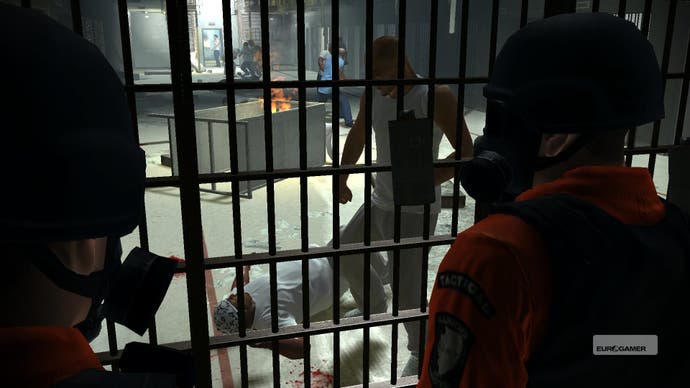Prison Break: The Conspiracy
Hard labour.
Slovenian developer Zootfly doesn't have the best luck. The studio first came to prominence when it floated a gameplay video of a Ghostbusters game online to excited responses from gamers and the sound of Hollywood lawyers swiftly shutting down their unauthorised tech demo. Needless to say, when the Ghostbusters game did arrive, it wasn't Zootfly behind the code.
And now here's Prison Break, scheduled for release in February 2009, but arriving at the arse end of March 2010 after the original publishers went bust. Zootfly financed the development internally until a new suitor could be found in the shape of Deep Silver. Applause and shiny gold stickers all around for dedication, but the downside is that the game is now based on a TV show that has finished, with the final episodes hitting US airwaves last summer.
The delay also has the unfortunate side effect of putting Prison Break in the same release window as Sam Fisher's stealthy return in Splinter Cell: Conviction. Comparisons to Ubisoft's Clancy-themed juggernaut are therefore inevitable, and sadly unflattering to Zootfly's cheap and uninspired offering.
Creeping around Fox River penitentiary as Company agent Tom Paxton, your mission is ostensibly to follow Michael Scofield, star of the TV show, to see what he's up to. We, of course, know what he's up to. He's got himself sent to the prison he designed so he can bust his brother out before he gets sent to the electric chair for murdering the vice president, which he didn't really do. Got that? Don't worry if not, since the plot of the show is little more than background noise in a game more concerned with sending you on menial fetch quests.

Almost immediately you run into one of Prison Break: The Conspiracy's most crippling problems. Set during the first season of the show, there's just not enough room in the story established on TV for an eventful videogame to squeeze into. Fans of the show, who must surely represent the game's main audience, will know how this ends, and that whatever tasks the game asks of you have already been made redundant by episodes that aired five years ago.
The player is always many steps ahead of Paxton's investigation, which lends proceedings the awkward air of meaningless filler. That's when the game actually lets your experience cross over with Scofield's. Such moments are rare, and serve only to remind you that there's a more interesting story happening elsewhere.
Having made itself inessential to the people most likely to overlook its shortcomings, Prison Break's videogame incarnation goes on to offer up a catalogue of poor gameplay features. There are just two main gameplay elements - stealth and hand-to-hand combat - and neither stands up to scrutiny. There's enormous potential in a jailbreak game, as Riddick proved, but Prison Break isn't interested in anything that might deviate you from its narrow path.


